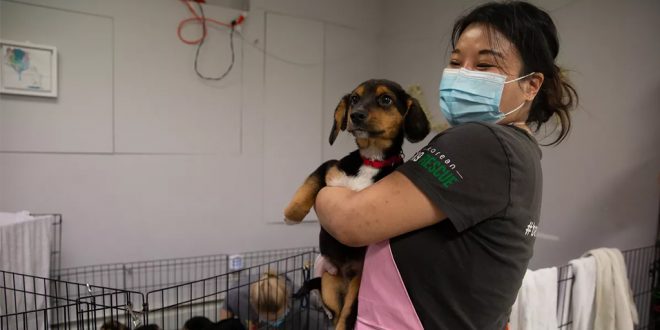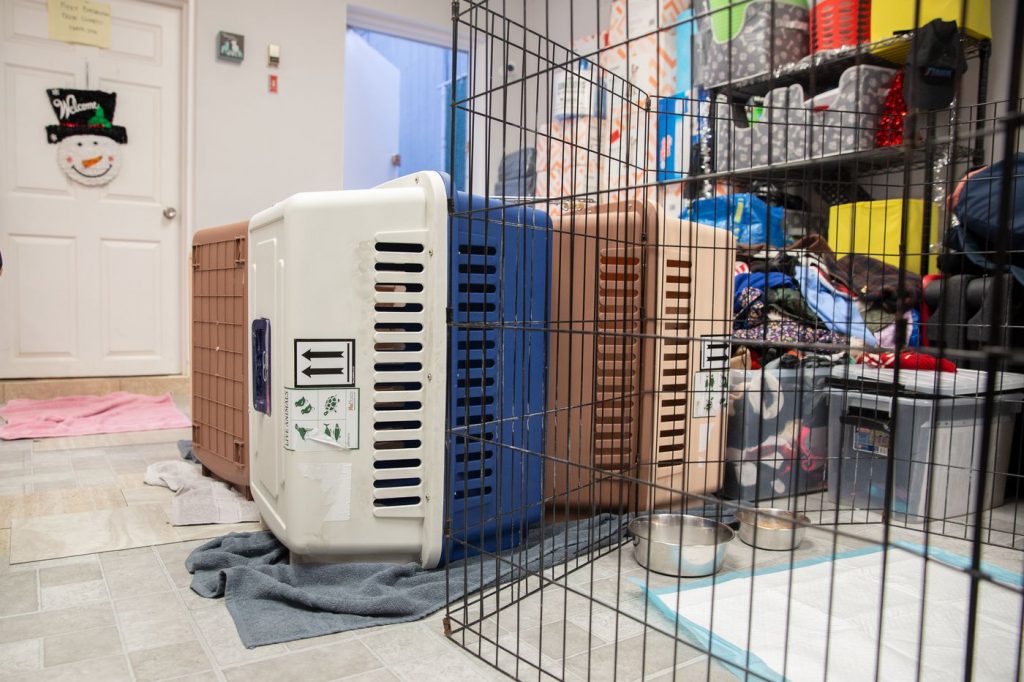Even as pandemic pets have become popular among New Yorkers seeking companionship at home, rescuing dogs from peril overseas has grown costly and fraught, groups that specialize in international adoptions say.
Some airlines have suspended programs allowing dogs to travel in the cargo hold of airplanes. Others have hiked costs to nearly the breaking point where adoptions would no longer be financially viable, multiple rescue groups told THE CITY.
Animal rescue organizations say they’ve been forced to pivot — prioritizing smaller dogs for cargo shipments priced by weight, bumping up adoption fees, and even chartering private airplanes. Meanwhile, the demand for pets, both from local shelters and abroad, remains high, despite adoption fees that can approach $1,000.
“If we keep going at this rate of having to continuously lose money then we may not have a rescue in six months,” said Gina Boehler, the founder of Astoria-based Korean K9 Rescue, which springs dogs from high-kill shelters and dog meat farms in South Korea.
“It just depends on which way the pandemic goes.”
Travel Charges Quadrupled
Last Tuesday, a dozen dogs including a litter of six floppy-eared puppies arrived in New York after a 14-hour Asiana Airlines flight from Seoul. Their journeys initially began at shelters in Gangneung and Pocheon where dogs that can’t be adopted are commonly killed.
The bill for their travel, encompassing the airline’s cargo fees and the costs of hiring an export company to manage the shipment, came out to $8,500.
Prior to the pandemic, these charges would have been scarcely more than $2,000, thanks to a robust supply of flight volunteers who brought up to three dogs per airplane ticket, avoiding steep cargo fees.
Before March, Korea K9 Rescue would typically have about six volunteers arriving from South Korea each week and rarely relied on cargo shipments of dogs barring extreme circumstances, Boehler said.
The cargo rate to ship dogs, which is calculated by weight, has increased by more than 50% for Asiana Airlines, she added. Asiana Airlines could not be reached for comment.
Despite these challenges, Korean K9 Rescue managed to help complete 480 adoptions last year, a significant increase over the roughly 300 adoptions conducted in 2019, Boehler said.
“The demand is there,” she added.
Soi Dog Foundation, which rescues strays in Thailand and relies on flight volunteers, has also struggled to bring animals to the U.S. during the pandemic.
Soi Dog team leader Nayomi Gunarathna said Thailand cargo rates have increased 20% to 30% during the pandemic.
“The increases are largely down to supply and demand,” she said. “There are fewer carriers flying these days. Routes and aircraft numbers are down.” Yet international cargo shipping has been booming — “and to the airlines, live animals are still considered as cargo.”
Chartered Planes
Many of the world’s largest airlines have changed their policies regarding animal travel.
Since the pandemic first began, both Delta and United have embargoed dog shipments by cargo. American Airlines is still permitting animals to travel by cargo, but is now charging $85 per shipment, a spokesperson said. Air France has prohibited all live animal cargo shipments to China.
Zani’s Furry Friends, an animal rescue that partners with local shelters in New York City as well as organizations in countries that include Kuwait and Russia, has nearly stopped its international adoptions because of travel restrictions.
Rescues bringing dogs from Puerto Rico and other domestic locations have also been limited by more expensive cargo costs and changes in airline policy. This means dogs, often larger ones, are left behind.
The Sato Project’s efforts to rescue abandoned dogs were impeded entirely from March through June, with the group unable to fly over any dogs with United Airlines, said Tara Steinberg, the group’s communications manager. United’s program remains halted.
“With no dogs leaving the island, our spaces remained full and we could not take in any new rescues from the streets,” Steinberg said.
It took a partnership with Wings of Rescue, an all-volunteer organization that flies pets on rented airplanes, for the Sato Project to resume adoptions starting in July. Each chartered flight costs about $70,000, so the Sato Project is not able to schedule flights regularly.
“These changes have definitely been prohibitive for many people and organizations wanting to transport animals during the pandemic,” Steinberg said.
Meanwhile, the number of adoption applications the Sato Project has fielded have nearly doubled, Steinberg added. The rescue transported 1,048 dogs and cats in 2020 — nearly 70% more than it did in 2019.
Pups Left Behind
Since the early days of the pandemic, New Yorkers have been adopting and fostering pets in record numbers.
Animal rescues and shelters told THE CITY they often receive hundreds of applications for a single puppy, even without directly meeting the pet. Most adoption processes are now conducted entirely virtually.
For several months, Bideawee, a no-kill pet welfare organization with locations in New York City and on Long Island, shut its foster care program down after it was deluged with applications.
Last year, 499 dogs and cats were fostered by volunteers, a more than 60% increase from the previous year’s total, said Heather Reynolds, Bideawee’s vice president of marketing and development.
Operators of international dog rescues say this unprecedented interest in adoptions is expected to continue as the pandemic lingers.
Jeffrey Beri, the founder of the nonprofit No Dogs Left Behind, which saves canines from Chinese slaughterhouses, said conditions for his rescue group remain a day-to-day challenge. Beri said that more than 170 dogs they’ve saved await new homes in the U.S, but the difficulty of organizing cargo transports and diminishing funds remain their largest obstacles.
“However, that will not stop us from saving lives,” he said.
Source: TheCity.NYC
Please Note: This article is not edited by DogExpress Team!

 DogExpress
DogExpress



















 in Chandigarh, India.
in Chandigarh, India. 
